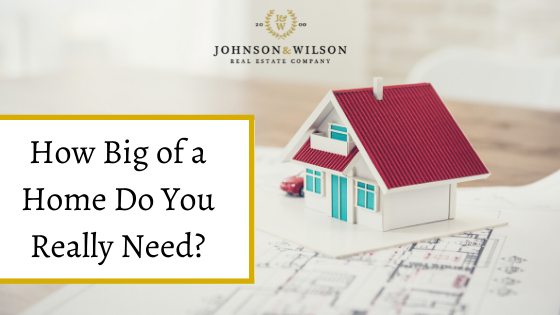Bigger isn’t always better, especially when it comes to buying a home. Larger homes are more expensive than their smaller counterparts, obviously. For some, a big house can also be a burden when it comes to cleaning, maintenance, and repairs. It can also be difficult to keep a bigger home tidy, despite the extra square footage for storage space. Then again, you don’t want to settle on a small home only to find that you feel cramped and claustrophobic. There are many factors that contribute to how big of a home you actually need. Read on to find out how to determine the amount of space you really need for your family and lifestyle.
Think About How Long You’ll Be in The Home
Will the house you’re buying now be your “forever home” or your “for now” home? Of course there’s no way to know for sure what the future will bring, but think about the parts you can control for the time being. Do you plan on starting or growing your family in the next few years? Is there a possibility you could move to a different area? Could things change where your job or career is concerned? If the answer to any of these is yes, then it’s likely that you won’t be in this home for more than five years or so. It’s more than okay to buy a house that suits your current needs, knowing that you might only live there for a few years. Your “for now” home can serve your needs while also helping you to build equity. It might even help you by netting you a big enough profit to serve as a down payment on your next home.
Determine Your Priorities
Watch any house-hunting show on television, and you’ll hear a lot about “entertaining space” and all the dinner parties the homeowners assume they’ll be throwing once they’re in their new home. In reality, how often do you really have guests over? Don’t spend more on a house for space that might only be used occasionally. Think about what you might be giving up for that extra space that could very well go unused. You can use the money you save when buying a smaller home for something like a travel fund or extra savings for a bigger home later on. And if location is your main priority, buying a smaller home can help you get into the perfect area for you on a smaller budget.
Pay Attention to the Floor Plan
Even in the largest of homes, a choppy, poorly designed layout can make a space feel cramped and dark. A smaller house can feel much friendlier and more spacious with the right floor plan and enough natural light. “The total square footage of a house can be deceiving,” says Patrick Ryan, senior vice president and managing broker of a Chicago-based realty firm. “Features like a long hallway may increase the total, but they are spaces you pass through, not a true destination within the home.” If the majority of your square footage is used on things like hallways, bathrooms, and bedrooms, what are you really gaining? Think about the rooms in which you’ll be spending the majority of your time, like a living room, den, or kitchen. If there’s plenty of space there, you’ll be perfectly happy.
Consider Your Financial Situation
Maybe you’re in the beginning of your career and looking forward to a higher income in the next few years. Perhaps you’re nearing the end of your career and your income has plateaued; it may even decrease upon retirement. Either way, it’s best not to buy a home that costs the maximum amount you can afford. The last thing you want to do is feel burdened by a mortgage that’s at the very top of your budget, possibly leaving you “house poor” in the end. When you think about the cost of a home, you also need to factor in things like maintenance, insurance, taxes, and more. Going with the biggest house you can afford could actually make it unaffordable when you add these things in. The last things you want from homeownership are endless stress and empty pockets.







